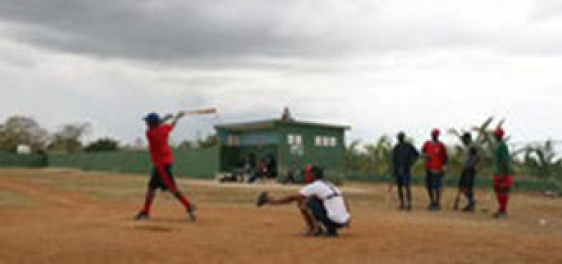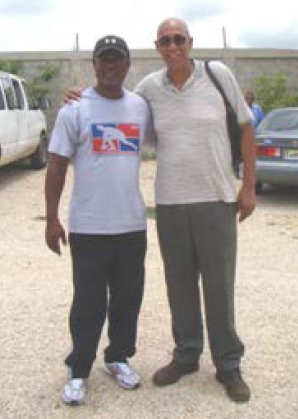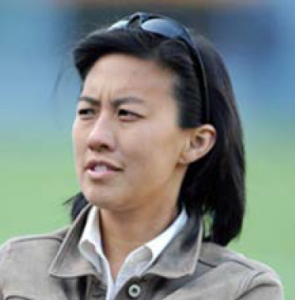Visits: 5
Volume V, Issue 3: A Publication For Your Reading Enjoyment
I finally got a chance to see “BALLPLAYER: Pelotero,” the controversial documentary that bills itself as a gritty look inside the world of baseball in the Dominican Republic.
As someone who first documented that world a dozen years ago, and presented a report to Major League Baseball that resulted in MLB opening an office in the Dominican Republic, I would like to think I have a pretty fair understanding of the industry, particularly as it has evolved over the years.
While “Pelotero” is provocative and entertaining, I do not think is presents a fair and accurate view of baseball in the Dominican Republic, in part because it focuses on the negatives and doesn’t fully take into account the measures Major League Baseball has taken to address those negatives.
Many of the cast of characters in the film are people I know, and I think the film goes out of its way to portray some as villains. In particular, I felt for Astin Jacobo, who develops young
players in the Dominican Republic and barters them to MLB teams. Some would call him a buscone, a term Jacobo considers derogatory to someone like himself who understands that baseball is a business, and that he performs a necessary service. My dealings with Astin have always been professional and courteous; he was one of the first trainers I know who embraced the need for reform in baseball in the Dominican Republic, asking only that decisions be inclusive of all vested interests, not just Major League Baseball’s.
Another flaw of the film is that MLB’s input is not included, though a disclaimer says MLB declined to participate. I have heard opposing reports, but I can’t help but believe that MLB, given the slant of the film, would have taken the opportunity to defend itself in what is certainly an unflattering portrayal of baseball in the Dominican Republic.
The film was shot over nine months in 2009, right when the movement to reform baseball was just beginning, and while “Pelotero” does acknowledge steps taken by MLB to address some of the corruption, much of the film’s central issues of age and identity fraud are different today than three years ago. I don’t think the same documentary could be filmed today, though issues of identity and age fraud remain, as does steroid usage and unethical practices in the procurement of players.
To date, I can reflect on only two films that I think give honest portrayals of baseball in Latin America. One is “Sugar,” which, while fictional, gives an accurate rendition of the life of a Dominican baseball player. The other is “BUSCON”, a documentary by award-winning director Anthony Alcalde, that examines the world of buscones with fairness and veracity, a world I have frequently referred to as a “necessary evil” whose evil components need to be weeded out.
I think my biggest problem right now is the media’s fixation on what is wrong with Dominican baseball without at least taking into account what is being done to make it right. As an advocate for reform, I have seen much change in the 12 years since I first documented for Major League Baseball many of the issues that have since come under scrutiny, and a lot of that change has come in the four years I have lived in this country. But the media still tends to focus on the negative, on the sensational.
A couple of months ago, I was contacted by a British television station interested in doing a documentary on Dominican baseball, including how the Dominican Republic Sports & Education Academy fits into the equation; we have always advocated that education of Dominican baseball players must be incorporated into the industry.
While I was originally given assurances that the documentary would be a “fair and balanced” portrayal of baseball in the Dominican Republic, on the eve of the film crew’s trip to the country I was told that the documentary would focus solely on buscones, which alone is only one small aspect of the big picture. I never heard from the Brits again, leaving me to suspect that soon there will be one more aggrandized “true account” of Dominican baseball that may draw viewers through its salaciousness, but will do nothing to accurately and fairly depict the business of baseball in this country.
I have yet to see the media at large document the positives the reform movement has brought, the measures Major League Baseball has undertaken to make things better.
I have yet to read or see anything substantive about MLB’s newest educational initiative (see below) to help prospects who have transitioned out of baseball.
I have yet to read or see anything substantive about Josefine Carrion, the new education coordinator Major League Baseball hired to oversee and review education programs that each MLB team has been mandated to develop.
- Josefine Carrion
I have yet to read or see anything substantive about programs and activities initiated by Kim Ng, senior vice president of baseball operations for Major League Baseball, to better showcase Dominican talent, particularly older players, which will help to minimize abuses. Ng is a visionary I think will one day be given serious consideration to be the commissioner of baseball.
I have yet to read or see anything substantive about Rafael Perez, who heads MLB’s Dominican Republic office, and is quietly, but effectively working to change the landscape of Dominican baseball for the better. As someone who has come up through the system, gone to college on a baseball scholarship, played professional baseball, worked in international player development, there are few others as knowledgeable and capable as Perez to make the decisions necessary to improve conditions for everyone in Dominican baseball, but most importantly the young prospects on whose skills the future of baseball depends.
When the media takes notice and reports on some of these positives in the Dominican Republic, the plethora of negatives that continue to be a focus of Dominican baseball can at least be put into perspective.
Understand, it is not my job or intention to defend Major League Baseball and its activities, but many of the initiatives the league has undertaken have long been advocated by the DRSEA, and I would like to believe that MLB takes seriously what we are about, as reflected in its actions.
MLB has taken some positive and dramatic steps to address the welfare of prospects, including creating educational opportunities, but, unfortunately, if the media continues to focus on the negative, those opportunities, as well as the activities of the DRSEA, will continue to be ignored and the focus will remain on a one-sided and distorted image of Dominican baseball.









You must be logged in to post a comment Login